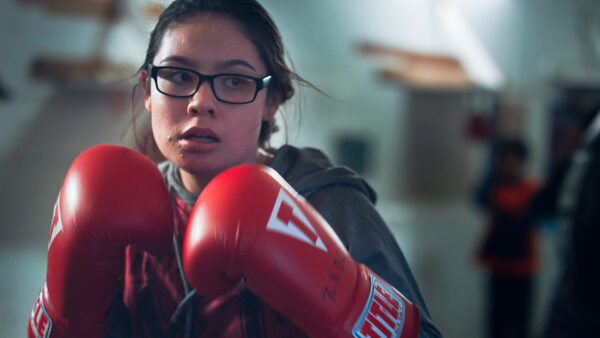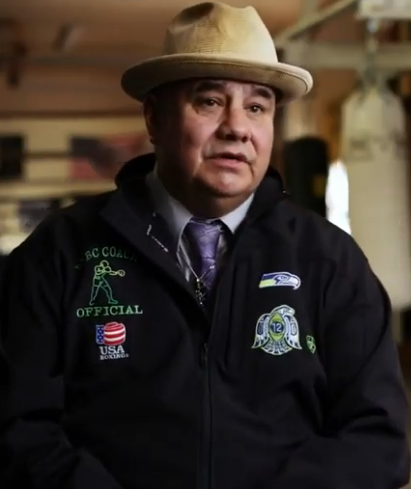
- Details
- By Levi Rickert
BLACKFEET INDIAN RESERVATION — On Tuesday, June 30, ESPN will feature Blackfeet Boxing: Not Invisible, a story of how former welterweight boxer (38-6) Frank Kipp (Blackfeet) has been training young American Indian girls and women to defend themselves through boxing so they don’t become another tragic statistic.
Kipp was born and raised on the Blackfeet Reservation, and worked as a probation officer there, witnessing the damage to its women and girls firsthand. It scarred him, and his people. He decided to fight back in the way he most understood. In 2003, Kipp—a former welterweight who won 38 bouts as an amateur—opened the Blackfeet Boxing Club.
“I started seeing girls getting bullied. And several in their 20s wanted to learn how to take up for themselves because they were getting abused. We start hearing about young ladies getting taken from Indian Country. And so, I started training my daughter and I told her if something happens, at least you're going to know how to fight for your life,” Kipp told MontanaSports.com.
 Frank Kipp trains Native females to defend themselves through boxing.
Frank Kipp trains Native females to defend themselves through boxing.
Since its inception, the gym has trained more than 500 boxers on the reservation, but for Kipp, over time, its most important fighters were the young women and girls, including his daughter Donna, who came in search of more than a heavy bag. They sought a way to protect themselves.
Kipp’s training Native females is much needed in Indian Country.
According to the United States Justice Department, American Indian women are ten times more likely to be murdered than non-Native women. More than one in three has suffered rape, or attempted rape, and more than 80 percent will experience violence at some point in their lives.
Blackfeet Boxing: Not Invisible short film follows two Blackfeet girls, Donna Kipp and Mamie Kennedy, as they learn to box, while facing challenges that afflict so many on the reservation — family dysfunction, substance abuse and the threat of danger, abduction and murder.
In addition to preparing young women to defend themselves, Kipp seeks to bring out the competitive spirit boxing can bring. His daughter, Donna, is determined to qualify for the Junior Olympics.
Kennedy is among the youngest and most ferocious fighters Frank has ever seen in his 18 years as a trainer. But her greatest fight is symbolic of so many other girls on the reservation—as she struggles with deep family dysfunction, the temptation of drinking and drugs, and her own uncertainty as a boxer.
Kipp and Kennedy train with the looming shadow of one Blackfeet Reservation girl who never made it to the gym, Ashley Loring Heavyrunner. Since her disappearance in June 2017, Loring Heavyrunner’s family has continuously searched for her while fighting for justice and recognition in the face of indifference from state and federal governments.
Blackfeet Boxing: Not Invisible was produced by Kristen Lappas.
More Stories Like This
Native News Weekly (August 25, 2024): D.C. BriefsUS Presidents in Their Own Words Concerning American Indians
Oral History Project Announces 14th Stop in Portland, Oregon: NABS Continues to Gather Crucial Stories Across Indian Country
Cheyenne River Youth Project Announces Native American Heritage Month Programming, Thanks for Kids Dinner
Monday Morning (November 3, 2025): Articles You May Have Missed This Past Weekend
Help us tell the stories that could save Native languages and food traditions
At a critical moment for Indian Country, Native News Online is embarking on our most ambitious reporting project yet: "Cultivating Culture," a three-year investigation into two forces shaping Native community survival—food sovereignty and language revitalization.
The devastating impact of COVID-19 accelerated the loss of Native elders and with them, irreplaceable cultural knowledge. Yet across tribal communities, innovative leaders are fighting back, reclaiming traditional food systems and breathing new life into Native languages. These aren't just cultural preservation efforts—they're powerful pathways to community health, healing, and resilience.
Our dedicated reporting team will spend three years documenting these stories through on-the-ground reporting in 18 tribal communities, producing over 200 in-depth stories, 18 podcast episodes, and multimedia content that amplifies Indigenous voices. We'll show policymakers, funders, and allies how cultural restoration directly impacts physical and mental wellness while celebrating successful models of sovereignty and self-determination.
This isn't corporate media parachuting into Indian Country for a quick story. This is sustained, relationship-based journalism by Native reporters who understand these communities. It's "Warrior Journalism"—fearless reporting that serves the 5.5 million readers who depend on us for news that mainstream media often ignores.
We need your help right now. While we've secured partial funding, we're still $450,000 short of our three-year budget. Our immediate goal is $25,000 this month to keep this critical work moving forward—funding reporter salaries, travel to remote communities, photography, and the deep reporting these stories deserve.
Every dollar directly supports Indigenous journalists telling Indigenous stories. Whether it's $5 or $50, your contribution ensures these vital narratives of resilience, innovation, and hope don't disappear into silence.
 The stakes couldn't be higher. Native languages are being lost at an alarming rate. Food insecurity plagues many tribal communities. But solutions are emerging, and these stories need to be told.
The stakes couldn't be higher. Native languages are being lost at an alarming rate. Food insecurity plagues many tribal communities. But solutions are emerging, and these stories need to be told.
Support independent Native journalism. Fund the stories that matter.
Levi Rickert (Potawatomi), Editor & Publisher

